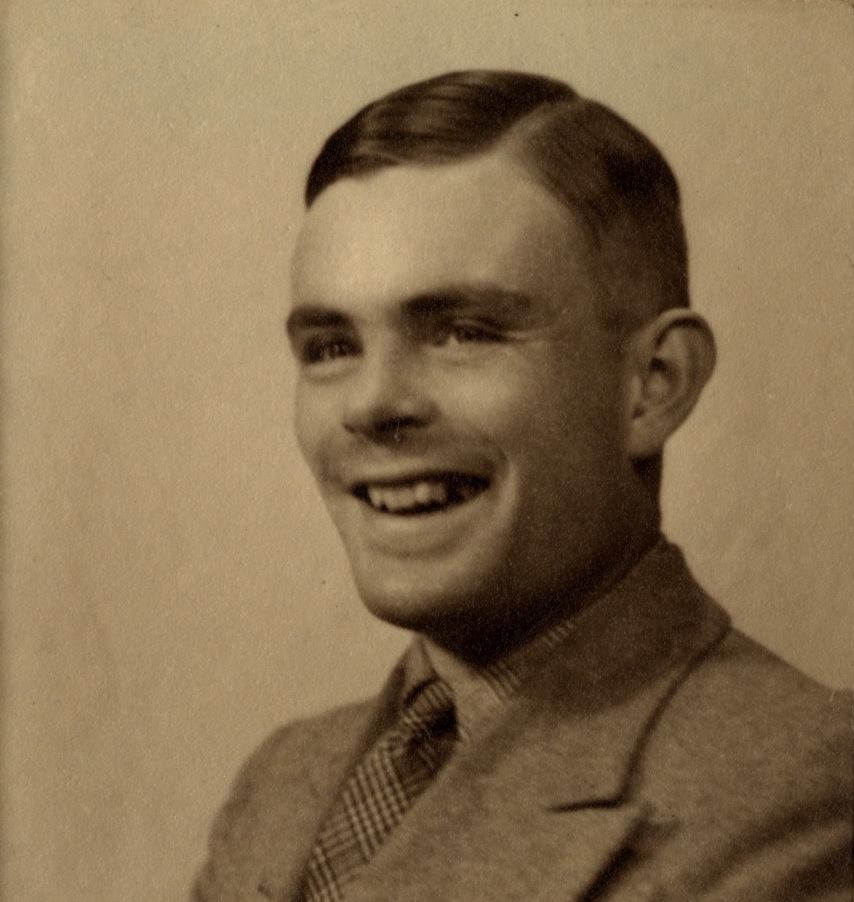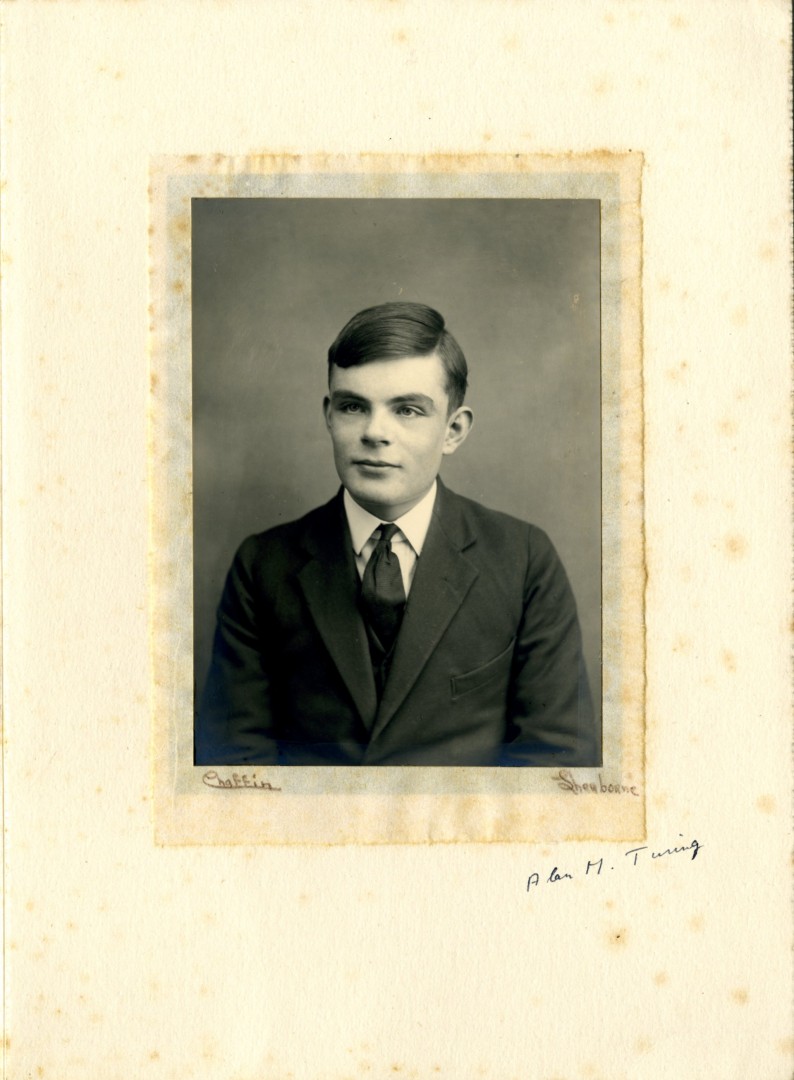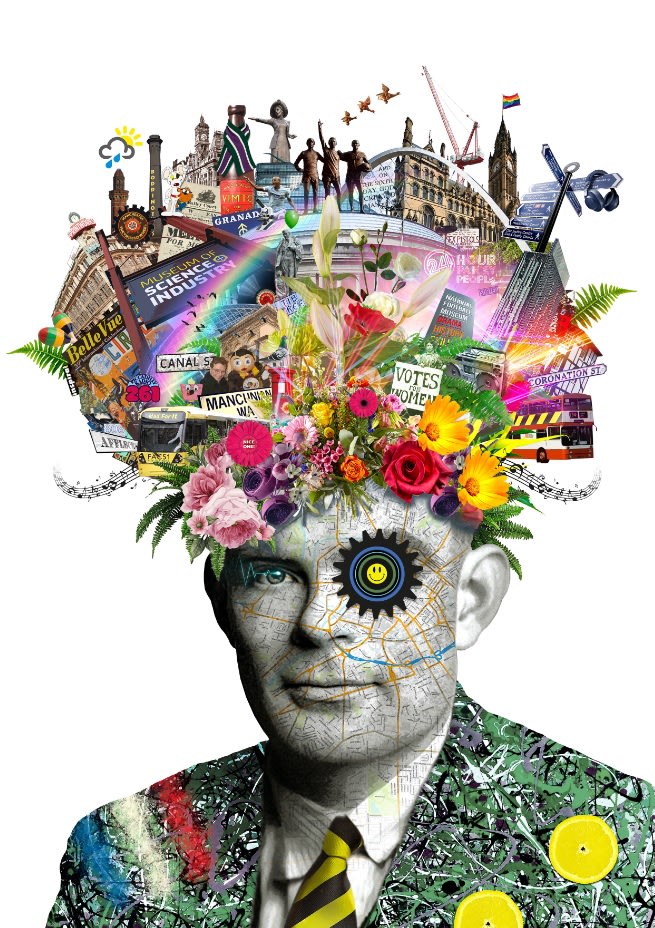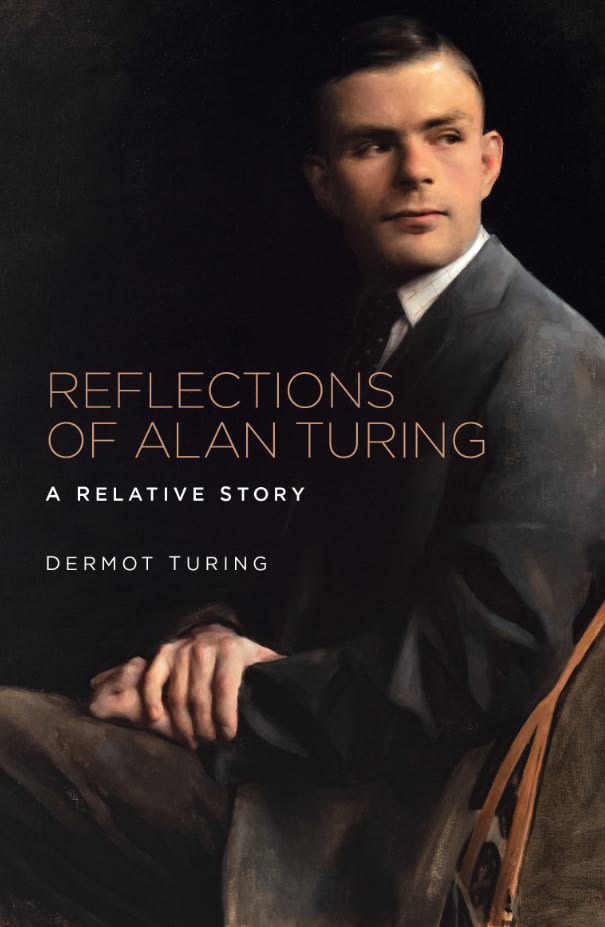 For many, Alan Turing’s story is an inspiration, but given the numerous biographies in circulation what more can we learn about the man? Sir Dermot Turing's Reflections of Alan Turing explores many topics typically connected to his work – including artificial intelligence, codebreaking, and security – debunking common myths and misconceptions along the way. Beyond this it also considers questions raised by different episodes in Turing’s life and background which have resonance in relation to wider themes today, including women in science, criminalisation of sexuality and iconography. Having grown up in the shadow of his uncle’s reputation and with access to family papers, Sir Dermot Turing is perfectly positioned to give a new perspective and answer for the first time in writing the questions that arise time and again from audiences at the talks and lectures he gives about his famous relative. Here the former law professional talks about his uncle’s suicide and problematic royal pardon, 60 years after his conviction for ‘gross indecency’.
For many, Alan Turing’s story is an inspiration, but given the numerous biographies in circulation what more can we learn about the man? Sir Dermot Turing's Reflections of Alan Turing explores many topics typically connected to his work – including artificial intelligence, codebreaking, and security – debunking common myths and misconceptions along the way. Beyond this it also considers questions raised by different episodes in Turing’s life and background which have resonance in relation to wider themes today, including women in science, criminalisation of sexuality and iconography. Having grown up in the shadow of his uncle’s reputation and with access to family papers, Sir Dermot Turing is perfectly positioned to give a new perspective and answer for the first time in writing the questions that arise time and again from audiences at the talks and lectures he gives about his famous relative. Here the former law professional talks about his uncle’s suicide and problematic royal pardon, 60 years after his conviction for ‘gross indecency’.
We last spoke to you just over a year ago when you were publishing X Y & Z: The Real Story of How Enigma Was Broken. Now you suddenly appear to have another book out…
It’s a factory! In the old days, when I had to squeeze books in between going to work and so forth, it was much harder. X Y & Z took a bit longer than this one because there was lots of research involved. For Reflections of Alan Turing, there was a bit of research, but by and large it wasn’t stuff for which I needed to go to overseas sources. Largely, I was able to get what I needed in the gaps between lockdowns.
Kayisha Payne has written the foreword for this book. Why is her contribution so important?
I contacted her out of the blue and I’m so pleased she agreed to do it. It’s not obvious why Alan Turing has got anything to do with underrepresentation of people from black and minority ethnic communities, in science, technology, engineering, maths subjects. But it’s something I’m very passionate about and the thrust of the book is to try and encourage people to look at Alan Turing and his legacy in a different way. Historically, we have looked at World War II and Bletchley Park, and patted ourselves on the back for winning. And we’ve slightly sanitised it; Bletchley Park is a place where people didn’t shoot each other, so one tends to glamourise it and think about it in a positive way. The other thing we are guilty of doing with his legacy, is looking back and saying, ‘didn’t they treat him so badly in the 1950s?’ and ‘haven’t we come such a long way?’; patting ourselves on the back for being so liberal, modern, and much more civilised than we were. That means we can be nice and complacent about ourselves and go home and have a cup of tea. Frankly, that annoys me, because it’s superficial. It annoys me because I’m sure Alan Turing would have deplored most of that. And the fact he’s of continuing interest to people should, to my mind, set a positive and forward-looking agenda, and it seems to me that he would be very passionate about things like underrepresentation of bright people – regardless of their skin colour, gender, background – in science, technology, and other related subjects (computer science in particular). These things are exciting, and people are missing out on them. So, to come back to the question, I am delighted Kayisha thought this was a good thing to do, and of all the people I’ve spoken to since she agreed to do it – from GCHQ, Bank of England, the Alan Turing Institute, various universities – I haven’t yet spoken to a single person who doesn’t think this is a great idea.
Alan Turing had what you describe as ‘empire heritage’.
From our position here in the third decade of the 21st century, the idea of the British empire is something in the very distant past. There was a Roman empire, there was a British empire, they’re all ‘bits of ancient history’. Alan Turing may be seen by us as a relatively modern character, but he was born to empire parents and the empire really didn’t come to an end until World War II, or rather after. So, he is one of those people who transitioned from, essentially, the Victorian age (although he wasn’t born in Queen Victoria's reign) in terms of what people thought of society and other cultures, right through to the modern period (if you can call the 1950s modern). If you’re steeped in a cultural mindset that the role of upper-middle-class British people is to go out and rule other cultures in an ‘enlightened’ way, and help them become more ‘civilised’, to cast all that aside and say, ‘all that stuff seems to be irrelevant. Do you know what I want to do? I want to be a mathematician and think about scientific problems’ – that’s very interesting to me. I think that is something, to an extent, he symbolises. I’m not sure that he talked about it much, but it’s clear in the choices he made that he was not in the least bit interested in the empire setup.
Below: Alan Turing at about the time of writing his paper On Computable Numbers. (Reproduced by kind permission of the Provost and Scholars of King’s College, Cambridge)
 We’re talking not long out of LGBT+ History Month (February), during which your uncle is frequently mentioned, but do you see a lot of misrepresentations of him?
We’re talking not long out of LGBT+ History Month (February), during which your uncle is frequently mentioned, but do you see a lot of misrepresentations of him?
This is a very interesting point and one that I try to tease out a little bit in the book. There’s a process which well-known figures go through, which is not of their own doing at all. It’s something that happens in the collective public imagination: reshaping the story of somebody to suit whatever cultural standards we happen to be fond of at the time – there’s a sort of fashion element to it. So, Alan Turing has become very fashionable recently and in the course of becoming fashionable – which he would think is the most hilarious thing imaginable – we’ve exaggerated some things and thereby created some falsehoods. One that I hear quite frequently is that Alan Turing was one of the first openly gay men. It’s not true. You would have to be quite reckless to be openly gay in the early 1950s when there was an enthusiastic police crackdown against gay men, which Alan Turing was caught up in. Because he is famous and was caught up in it, he is now ‘openly’ gay. So, where did the ‘openly’ come from? That’s part of the mythmaking. We have associated him as a key figure in that story and suddenly the adjective has been appropriated. That’s just one example, I could give you dozens, and many of them come from dramatisations of his life. People don’t realise where dramatic licence has been used in a screenplay and imagine what they have seen is gospel truth.
You write, ‘The British Establishment did not hang Alan Turing out to dry.’ The British establishment being the government, right? Just to check your definition isn’t more nuanced than that.
I think it possible is more nuanced. One of the subeditor's headlines, if you like, on the life of Alan Turing is: ‘this is the amazing codebreaker who was rewarded for his efforts in World War II by being hung out to dry by the British establishment.’ By which we mean prosecuted, forced to take this hormone treatment, and then – as a result of these terrible things that happened to him – he took his own life. There are points and milestones along that storyline which are roughly true in terms of hard facts, but then the process by which you get from one milestone to another is again one of those things that has got distorted, because we’ve appropriated the Alan Turing story to fit a narrative we like. The British establishment, insofar as it was part of Alan Turing’s life and experience, was largely the National Physical Laboratory (essentially government-run) and of course GCHQ (Alan Turing still had a consulting role for GCHQ up until the point of his trial in 1952).

So, the question about whether the establishment was hanging him out to dry was really to do with how the establishment, in the form of these organisations, was going to react when they found out he was being prosecuted. The answer is the NPL folks didn’t know anything about it and were not in the picture so can’t be blamed for anything, and the GCHQ folks, quite the opposite. These guys, who were the secret spies, come out of the shadows. So, Alan Turing’s ex-colleague Hugh Alexander (from Hut 8 at Bletchley Park, by now a senior figure at GCHQ) comes and speaks in his defence at his trial. This is not just a nice thing to do, it’s actually completely influential in the outcome of the trial, because instead of Alan Turing going to prison, losing his job, and having a criminal record – which is what happened to all the other gay men who were prosecuted or tried on the same day – the evidence given by Alexander (and by Professor Newman from Manchester University, also ex-Bletchley Park colleague and establishment figure) convinced the judge that probation would be the right answer. These very impressive people told the judge that Alan Turing himself was very impressive, he had done amazing things in World War II, and his current research was vital for the nation. I think that’s pretty good on the part of the establishment. Things went wrong after that because Alan Turing was handed over to the care of medics who had completely crazy ideas about mental illness. They were trying to figure out how being gay was a form of mental illness, and therefore they were trying to ‘treat it’... I think the politest thing I could say about them is they were clueless. I could come up with more negative adjectives. But the establishment can’t be blamed for what happened to him.
So, it’s possibly more the medics’ fault that he killed himself?
There, again, there’s a link between how he was treated and his death which I don’t think we can establish. We’ve got two years between Alan Turing being tried and taking his life. The first of those two years is when he was undergoing this hormone treatment. The interesting thing about reading what little remains of the letters he wrote to people during that period, is he was actually quite – I’m not going to tell you he was positive about having to take this course of synthetic estrogen, he wasn’t – but he was not depressed about it, not subdued by it, and he was not repressed in terms of his vitality. By 1953 it was all over, he’d had the hormone implant removed, and he was back to normal in terms of getting on with his career and social life. So, I have to say, although I had myself imagined that there would be a cause or link between the hormones and his mental state at the time he died, I couldn’t find it. I think we have to find another theory as to why he took his own life.
He did get an apology from Gordon Brown on behalf of the government about 12 years ago, and then a royal pardon in 2013. The later of those sounds like a good thing but It’s actually a bit problematic.
At the time of the pardon, I was often asked what I thought about it. Forgive me, but this is the typical journalist’s statement: ‘you must be so proud that your famous ancestor has received a royal pardon.’ To respond to that at the time was difficult but I can happily explain the confused feelings I had about it now. First of all, if you don’t think that Alan Turing did anything wrong, why is he being pardoned? If I steal your car, give it back the next day and say I’m sorry, then you can say: ‘that’s alright, you’re pardoned.’ I did something bad, you pardoned me. Who did something bad in the Alan Turing case and who’s giving the pardon? We’ve got that inside out, so that’s one problem I’ve got with it. The bigger problem I have is that he was being singled out from the not-quite 50,000 gay men who were prosecuted under the same piece of legislation. Why is one of them singled out for a pardon – even if you think the pardon is a good thing – and the others ignored? ‘Oh, it’s because he’s famous’... Well, that seems to me to be fairly rubbish and I think he would have deplored that.
I also have to say – there’s a lawyer’s thing coming in here – we have had all sorts of bad bits of legislation in our history. This may be a notorious example but it’s not the only one. Lots of people got prosecuted under bad criminal laws in previous eras, and if we’ve just repealed this particular piece of legislation, and then we say that means the people convicted under it should receive pardons, suddenly there’s going to be a pardon industry going where every single criminal offence that’s been taken off the statue books is going to demand pardons. So, it was a bad law, I’m not trying to defend it, it should never have been passed in the first place. But all this tells me is that – I’m sorry, this is going to sound frightfully cynical – the Gordon Brown government apology can’t be criticised on any of those grounds. It was a very good gesture, extremely welcomed, and I don’t have anything other than positive feelings for it. But I observe that by the time the royal pardon comes along, we have had a change of government. A new government that has come in and decided it wants to recruit Alan Turing to make it look good. ‘We can’t just have Labour looking good, what can we do that’s one better?’ That’s how it seems. And that political appropriation of Alan Turing has happened further with another change of government, and the idea we can now solve the problem of the disregarded 50,000 and give them pardons as well. And even that’s a screw-up because when you actually dive into the legislation, you discover that the only people who automatically got their pardons – under the thing that unfortunately became known as the Alan Turing law – were dead. Live people who have been convicted are treated worse than dead people, because they have to apply to the home office to get their pardon, and that strikes me as being both bizarre and shameful. We treat the living worse than the dead.
You join us via Zoom, please, just finally, explain your backdrop.
This is by a Manchester-based artist called Justin Eagleton. What Justin has done – he’s doing another portrait of Alan Turing this year which I’m looking forward to seeing – is all about Manchester. There’s lots of Manchester iconography in there, and lots of stuff about Pride. Manchester has kind of adopted Alan Turing as somehow a symbol of their city and that’s great, really nice. BBC Two viewers, a couple of years back, decided to vote Alan Turing as their icon of the 20th century. So, really the point of putting up Justin’s picture is that it’s a great example of iconography and how people have sort of taken Alan Turing to heart. His work’s great, and this is fun, colourful, exciting, and gets the whole debate about what makes someone into an icon going.
Reflections of Alan Turing: A Relative Story (The History Press) is out now.










